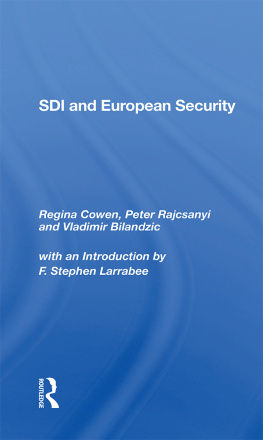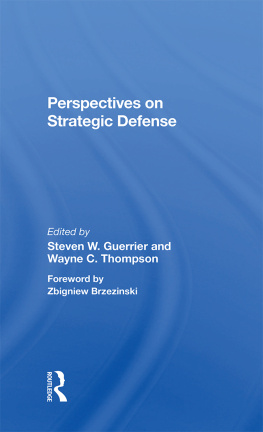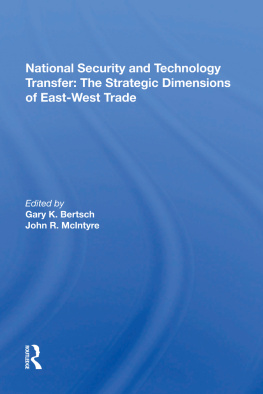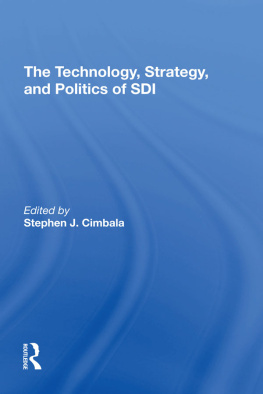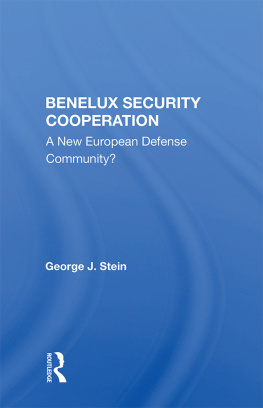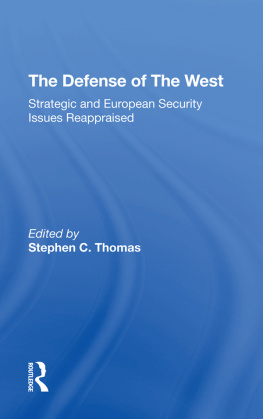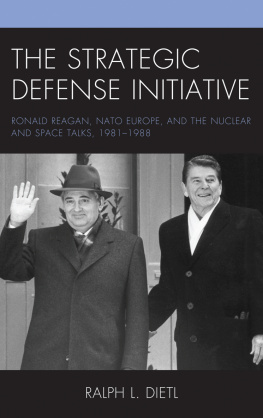East-West Monograph Series 5
SDI and European Security
Regina Cowen
Peter Rajcsanyi
Vladimir Bilandzic
with an Introduction by
F. Stephen Larrabee
First published 1987 by Westview Press, Inc.
Published 2019 by Routledge
52 Vanderbilt Avenue, New York, NY 10017
2 Park Square, Milton Park, Abingdon, Oxon OX14 4RN
Routledge is an imprint of the Taylor & Francis Group, an informa business
Copyright 1987 by the Institute for East-West Security Studies, Inc., New York.
All rights reserved. No part of this book may be reprinted or reproduced or utilised in any form or by any electronic, mechanical, or other means, now known or hereafter invented, including photocopying and recording, or in any information storage or retrieval system, without permission in writing from the publishers.
Notice:
Product or corporate names may be trademarks or registered trademarks, and are used only for identification and explanation without intent to infringe.
Library of Congress Cataloging-in-Publication Data
Cowen, Regina H. E.
SDI and European security.
(East-West monograph series; #5)
1. EuropeNational security. 2. Strategic Defense
Initiative. 1. Bilandzic, Vladimir, 1946
II. Rajcsanyi, Peter M. III. Title. IV. Series.
UA646.C74 1988 355'.03304 87-35290
ISBN 13: 978-0-367-28680-4 (hbk)
Table of Contents
F. Stephen Larrabee
Regina Cowen
Peter Rajcsanyi
Vladimir Bilandzic
Guide
European concerns about strategic defense and its impact on the stability of the East-West strategic balance have been the subject of frequent and lively discussion at the Institute for East-West Security Studies in the more than four years since President Reagan announced his Strategic Defense Initiative (SDI) in March 1983. The three essays in this monograph, written by former Institute Fellows from the United Kingdom, Hungary and Yugoslavia, look at the Strategic Defense Initiative from specifically European perspectives and emphasize the consequences of SDI for Europe.
The monograph fills an important gap in the literature on the subject which has tended to overlook the European implications of strategic defense. In addition, the chapters present three contrasting European perspectivesone from a NATO country, one from a Warsaw Treaty nation, and one from a neutral/nonaligned statein accordance with the Institute's aim of treating security issues from a broad East-West perspective.
The authors are well qualified to comment on the impact of strategic defense for Europe. Regina Cowen, from the United Kingdom, a Resident Fellow at the Institute in 1985-1986, is a specialist on European defense issues currently working as a Research Associate at the Stockholm International Peace Research Institute. Peter Rajcsanyi, from Hungary, a Resident Fellow in 1984-1985 and again for part of 1986, is a specialist on transatlantic relations now with the Central Committee staff of the Hungarian Socialist Workers Party. Vladimir Bilandzic from Yugoslavia, a Resident Fellow in 1983 and 1984-1985, is a Senior Research Associate at the Institute of International Politics and Economics in Belgrade, and has been a member of the Yugoslav delegation to the CSCE talks on European security in both Madrid and Vienna.
The authors would like to thank the Institute staff, particularly Vice President and Director of Studies F. Stephen Larrabee, for their encouragement and comments throughout, and the East-West Fellows at the Institute from 1984 to 1986, who played such an instrumental role in creating the stimulating intellectual atmosphere from which these essays emerged.
The authors' stay at the Institute was made possible through the generosity of The Ford Foundation and the Alfried Krupp von Bohlen und Halbach-Foundation in Essen. The Institute also gratefully acknowledges the support of The Ford Foundation for the publication and dissemination of this study. The views expressed in this monograph are solely those of the authors and should not be ascribed to the funders of this study or the Institute. The Institute for East-West Security Studies is pleased to sponsor the publication of this monograph as a contribution to the debate in both East and West about this critical issue of international security.
John Edwin Mroz
President
Institute for East-West
Security Studies
New York
October 1987
F. STEPHEN LARRABEE
Since its official inauguration on March 23, 1983, by President Reagan, the Strategic Defense Initiative (SDI) has been a subject of considerable controversy. Most studies, especially in the United States, have concentrated on issues related to SDI's technical feasibility and its impact on the security of the two superpowers. Very little consideration has been given to European perceptions and the impact that any deployment of strategic defenses might have for Europe. Indeed, President Reagan's speech announcing SDI was made without any consultation with America's West European allies and only briefly mentioned them. Yet as the essays in this volume make clear, the development of strategic defenses is of vital concern to Europeans as well.
This volume, part of a series of ongoing projects undertaken by the Institute to analyze the implications of defensive systems for East-West security,trates on the implications of SDI for U.S.-Soviet relations and arms control; and Vladimir Bilandzic from Yugoslavia analyzes European attitudes and responses to SDI, including those of the neutral/nonaligned countries.
Technology vs. Politics
What is perhaps most striking about the essays in the volume is the degree to which the authors, despite their diverse political-ideological backgrounds, share certain basic attitudes. The first is a tendency to see security in broad political terms rather than in strictly military or technological terms. This tendency differentiates Europeans from Americans. As Christoph Bertram has pointed out, the experience of Europeans leads them to conclude that security is, above all, "a political task." Thus, as he notes, Europeans tend to ask more often than Americans what the political consequences of a new weapons system are likely to be. They suspect that whatever new sophisticated weapons systems are introduced the political problems will be the same.
This basic "European mindset" is strongly reflected in the contributions to this volume. All three authors, their very different political-ideological backgrounds notwithstanding, are profoundly skeptical about SDI's ability to contribute to greater security; all three see the basic problem as a political rather than a technological one; all three are concerned about the impact SDI will have on the broad political framework of East-West relations.
The views of the three authors coincide on a number of other points as well. Both Cowen and Rajcsanyi see SDI not as a break with the past but as part of a general evolution of U.S. strategy. SDI, as Cowen argues, is not a revolutionary concept. She sees the concern with active defenses as "part of a larger debate on U.S. strategy." In her view President Reagan's speech on March 23 "merely increased the prominence of active defenses within that debate." Similarly, Rajcsanyi regards SDI as part of a larger search for greater flexibility in U.S. strategic doctrine and as an evolutionary response to the problem of increasing ICBM vulnerability, while Bilandzic sees its origins in the disenchantment of both superpowers, particularly the United States, with the strategy of mutual assured destruction (MAD).

